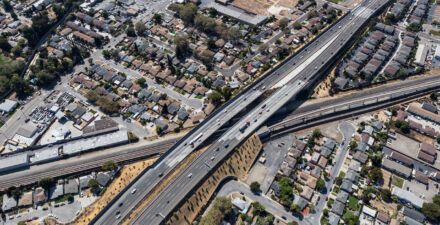The historical legacy of racial and ethnic discrimination in the United States continues to determine economic outcomes today. Far too often one’s race and ethnicity shape the ways in which one’s characteristics are valued by employers and the economy. Intentional policies have identified winners and losers based on their racial and ethnic background, such as redlining and the lack of enforcement of anti-discrimination laws. Equitable Growth elevates a racial and ethnic lens on the U.S. economy to draw attention to persistent disparate outcomes by race and ethnicity.
Featured work
Police in public schools harm students, leading to far-reaching socioeconomic inequalities alongside less safe schools
April 19, 2023
April 19, 2023
New research documents the high cost of residential racial segregation in Northern cities of the United States
May 9, 2022
May 9, 2022
The importance of anti-discrimination enforcement for a fair and equitable U.S. labor market and broadly shared economic growth
December 21, 2021
December 21, 2021
Wealth of two nations: The U.S. racial wealth gap, 1860-2020
October 5, 2022
October 5, 2022
The logistics of a reparations program in the United States
February 18, 2020
February 18, 2020
Racial equity in U.S. data collection improves the accuracy of research, policy evaluation, and subsequent policymaking
September 28, 2021
September 28, 2021
Explore Content in Race & Ethnicity495
The Self-Taught Economy: Open Access and Inclusion in the Tech Industry
August 29, 2022
August 29, 2022
Caregiving Arrangements for Older Adults: The Roles of Family Characteristics and Public Benefits
August 29, 2022
August 29, 2022
Do Labor Strikes Achieve Worker Demands? Understanding Strike Outcomes and Effectiveness
August 29, 2022
August 29, 2022
Collateral Consequences: How Driver’s License Suspensions Create Barriers to Work
August 29, 2022
August 29, 2022
Race and Outside Options: Evidence from U.S. Employer-Employee Data
August 29, 2022
August 29, 2022
The Impact of Natural Disasters on Firm and Labor Dynamics
August 29, 2022
August 29, 2022
The Effects of the Child Tax Credit on the Economic Wellbeing of Families with Low Incomes
August 29, 2022
August 29, 2022
Inequality in Health Returns to Local Labor Markets: Extraction Booms and Mortality among Native Americans
August 29, 2022
August 29, 2022
The Role of State Policy in Reducing Disparities in Unemployment Insurance Recipiency
August 29, 2022
August 29, 2022
Explore the Equitable Growth network of experts around the country and get answers to today's most pressing questions!








